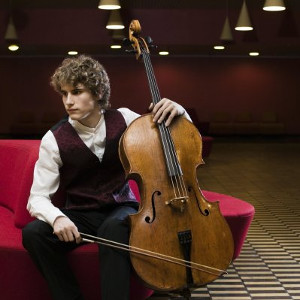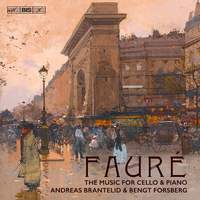Recording of the Week,
Andreas Brantelid and Bengt Forsberg perform Fauré's complete works for cello and piano
This week’s disc sees a Scandinavian collaboration: Danish cellist Andreas Brantelid and Swedish pianist Bengt Forsberg (known particularly for his work with the innovative mezzo Anne Sofie von Otter) present a relatively unexplored corner of Fauré’s compositional output – a collection of pieces both large and small for the cello and piano.

The album both opens and closes with the Romance from 1894 – first in its final form for cello and piano, and at the end reappearing in its original version with harmonium accompaniment. Clocking in at just under four minutes, it sets out the stall for Fauré’s inimitable, but often hard-to-pin-down, harmonic and melodic style. After this first track – charming, and of course excellently performed, but not particularly profound – one might initially form the impression that the album would be a little saccharine. Fortunately, this quickly turns out not to be the case, as a succession of more substantial works shows.
Two of Fauré’s most popular works appear in arrangements by the composer for cello and piano – the Berceuse from the Dolly Suite and the Sicilienne – and the delightful, fluttering Papillons (Butterflies), which offers Brantelid a chance to show his leggiero touch, is clearly a Fauré-fied Flight of the Bumblebee. Indeed, it was explicitly commissioned as such by his publisher Julien Hammelle to follow up on an earlier success. This was a source of some frustration for the composer, who disliked the crass pictorialism encapsulated in its mass-market title, and long held out for the more neutral Piecè pour violoncelle.
The precursor piece that sparked the Papillons commission, the Élégie, is probably my favourite work on the disc. I often find that one particular track on a given album sticks with me and tempts my finger to hit the rewind button to hear it just one more time… and on this disc the Élégie was definitely that track. Initially eschewing the overwrought soul-searching of some other cello works of the same period (Dvořák’s concerto, for instance, or Rachmaninov’s sonata) in favour of a simple, mournful melody of great beauty, it certainly doesn’t come up short when the tragic climax of the recapitulation arrives, reclothed in Lisztian arpeggios that offer Forsberg a brief chance to play the concerto-soloist. It’s easy to see why Fauré was unimpressed at his publishers’ eagerness to follow it up with a lightweight, airy caprice.
As I’ve hinted above, however, there is rather more to this disc than a collection of small (if perfectly-formed) character pieces. The two main works are Fauré’s two cello sonatas, both late works written when the composer was suffering from increasing deafness and showing his autumnal, and in many ways stricter, style. The first sonata in particular, dating from 1917, seems to process feelings of anger and resentment at both his own struggle with hearing loss and the cataclysm enveloping Europe, with an unsettled and at times even violent opening movement in which both musicians seem to relish reminding us that they don’t always play nice.
By the time the second was written, only four years later, Fauré seems to have come to terms with his aging and his almost total deafness. The sonata recaptures some of the sunny character that had typified his earlier writing, and was regarded as youthful and even ‘perky’ by his musical contemporaries (Vincent d’Indy, to name just one) – though in its slow movement echoes of the Élégie are never far away.
Brantelid demonstrates his beautiful singing tone throughout this disc, and an excellent recorded balance between cello and piano means you hear all the detail at all times. The performers clearly have a great rapport as phrasing and character are always well matched, whilst a gentle and subtle use of tempo rubato (slightly speeding up and slowing down) helps create long dreamy lines in the slower phrases and builds excitement in the more dramatic ones. It is never over-indulgent, though, and so you never lose sight of the longer musical line.
I’ll admit that when I first started listening to this disc I was half-expecting it to be simply, well, ‘nice’ – 70 minutes of music in the spirit of the Pie Jesu and In Paradisum from the Requiem, or similar. There is, though, a depth and at times a darkness in these works that came as a welcome surprise – always filtered through the prism of Fauré’s restraint and refinement, but very much audible nonetheless. It would be easy to slip into thinking that there are in some sense two Faurés – a serious one who writes sonatas and a more superficial one who writes sparkling miniatures – but this isn’t accurate. Both sides of the composer’s musical personality are constantly present, and it’s only really from listening to this disc that I’ve come to appreciate how they interact with each other.
Andreas Brantelid (cello) & Bengt Forsberg (piano)
Available Formats: SACD, MP3, FLAC, Hi-Res FLAC



